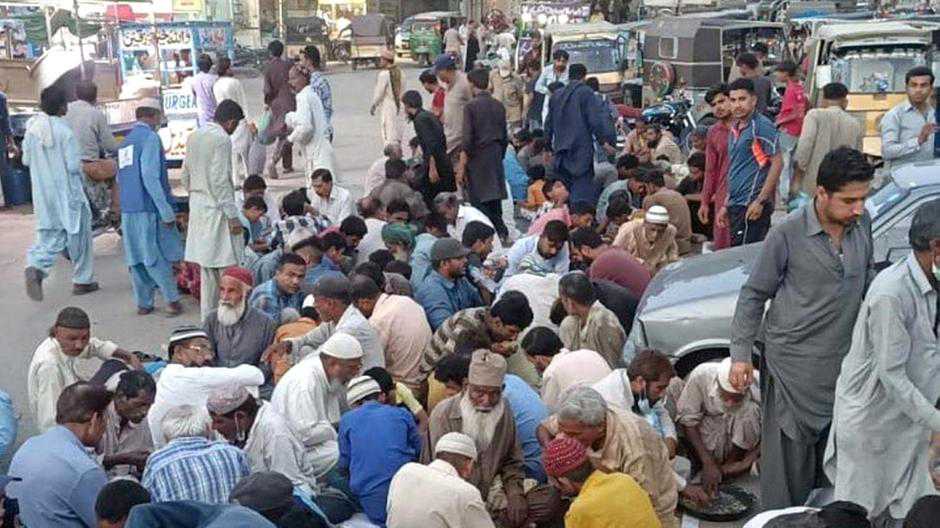Pakistani help group sees former recipients return as volunteers for Ramadan meals drive
06 May, 2021

A Pakistani student aid group is seeing an enormous increase in food help requests over Ramadan this season as Covid-19 continues to ravage lives and the economy.
Hamdaard Haath is now in its fifth 12 months of operation, catering to the needy in Pakistan’s two largest cities, Lahore and Karachi. Some of these volunteers had been once recipients of the group’s foodstuff aid.
The group says they are acquiring many more requests for food aid than this past year, and increasing popularity of their dastarkhwans, a sit down iftar where volunteers set up food and refreshments for passersby.
One such recipient is 65 time older Rukhsana, who visits the open iftar exterior Al Rehman Marquee, near among Lahore’s busiest roads, with her grandson, who accompanied her to make certain she didn’t have to be alone.
She said this is the first-time she had heard about the iftar drive, through younger members of the family who she lives with.
“We’re a large family, and we usually have iftar at house, but when I heard about this I wanted to come below. This is God’s do the job they’re doing here.”
Covid-19 restrictions largely curtailed the Hamdaard Haath’s activities because the pandemic began, but this Ramadan the teams in Karachi and Lahore gained permission to carry out their standard dastarkhwans.
Malik Hamail, among the founding people of the group said that for his band of young college students, the only objective was to make a dent on the rampant hunger around Karachi, where in fact the group was founded.
“We began with offering iftar boxes about 50 % one hour before iftar time, across the town, trying to covers as much surface as we could.”
The team would gather within their own cars and travel around busy regions of the city, offering boxes to labourers, rough sleepers and anyone else who approached.
The operation has professionalised somewhat because the times of scattered deliveries, and spread to Pakistan’s second greatest city, Lahore. It’s an excellent task, as demand because of their help is greater than ever.
Where they would usually receive a few hundred applications for Ramadan rashans, this season they received over 1500 just as the economy has taken a hard hit. The country’s GDP has plummeted from 5 % in 2018,to -0.4 % in 2019-2020 and as lockdowns continue authorities predict the problem will worsen.
Simply just this week Pakistan saw its highest death toll of the pandemic at 201 deaths and the united states is moving towards yet another strict lockdown. For informal operating sectors, which employ predominantly girls and daily wage labourers, this may mean a loss of income indefinitely.
“Over the last two Ramadans, amidst the pandemic, we'd over 1500 applications from various areas and communities who normally wouldn’t ask for charity in Ramadan but have been forced to do so due to the pandemic,” said Mr Humail.
A young boy around 12, accompanied by a group of friends waiting for the dastarkhwan to be setup, said the previous two days of having this food get in Lahore have been a welcome relief.
“Most foodstuff drives give food away, and this year there are so many people fighting to take it that as young children, we typically get pushed to the side. This way, we reach eat in peace.”
The change to sit down dastarkhwans was a hard decision for the group. Rafay Qandhari, another founding member, said the price tag on a month’s worthy of of iftar boxes amounted to simply four to five times of serving the dastarkhwan.
But, now within their fourth year of serving meals in this manner, they’ve turn into a staple for the communities they serve. Those that once needed the assistance to eat now return to help others.
“This past year, the pandemic struck all of us hard and there have been days we didn’t possess anything to consume,” an office worker volunteering as of this year’s dastarkhwan next to Karachi’s Khayaban-e-Shahbaz told The National.
“We had to arrive eat here many times previous Ramadan and the comfort of experiencing such a space is a good blessing”, he explained, adding that now that he was in a better place he wished to help the reason forward and conduct his part.
Needing to cover costs hasn’t been the only task they have faced. An individual dastarkhwan costs 30-40,000 PKR for an individual day and the team is currently hosting 5 of the across two places, a daily price of around 150-200,000 PKR.
They go solely on donations which year the group used Paypal for the very first time, to inspire international donations
As costs rise, the group has been forced to lessen the size of food rations to feed more folks, an approach which has garnered criticism from some.
“There’s always a good critic for everything but we felt that if we're able to help more people, we'd be doing considerably more of what we had aimed to do therefore we made a decision to do larger amounts of smaller rations.”
Hamdaard Haath has come quite a distance from their first food drive and they don’t anticipate stopping.
“We started from 16 rashan totes,” says Qandhari. “This past year, we made 7000. The one thing is we never halted believing in ourselves”.
Source: www.channelnewsasia.com
